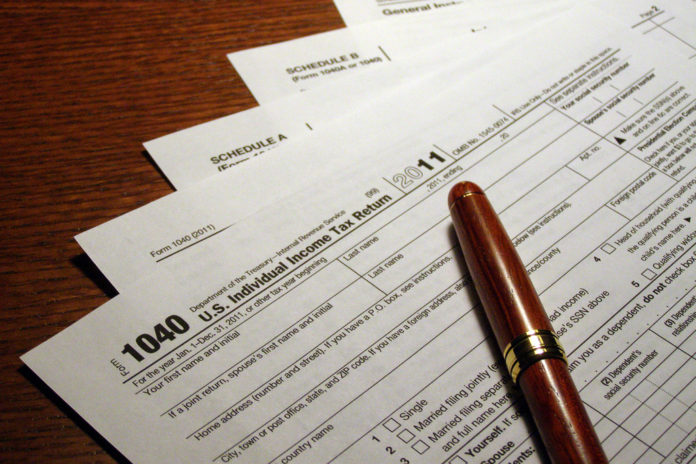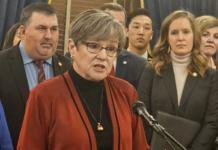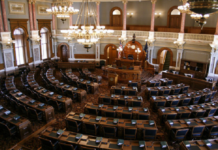The Kansas Legislature on Monday overrode Democratic Gov. Laura Kelly’s veto of a tax bill that she forecast could return the state to an era of budget turbulents experienced during former Gov. Sam Brownback’s administration.
The Senate voted 30-10 to override the veto while the House approved the bill 84-39. The House approved the bill with the minium two-thirds majority required after it received 81 votes when it passed the House on March 30.
Republican state Reps. Trevor Jacobs of Fort Scott, Cheryl Helmer of Mulvane and Michael Houser of Columbus flipped their votes to “yes” on Monday to help put the bill over the top.
All three were endorsed during the last election cycle by the Kansas Chamber of Commerce, the chief supporter of the bill.
They were joined by embattled Rep. Mark Samsel who voted for the bill after opposing the legislation. The chamber did not support Samsel last year.
Rep. Ron Howard, who is seriously ill, came to the Capitol in a wheel chair and voted for the tax bill.
House Republicans, meanwhile, lost Reps. Dave Baker of Council Grove and Boyd Orr of Fowler, who opposed the bill after voting for it initally on March 30.
Democratic Gov. Laura Kelly harshly condemned the new law hours after it passed.
“Senate Bill 50 is reckless, shortsighted, and jeopardizes our ability to fund education and will leave Kansans on the hook for another tax-cut that we can’t afford,” Kelly said.
“It’s as if legislative leaders want to return to the days of budget crises, gutting transportation spending, and 4-day school weeks. I’ve never met a Kansan who wants that,” Kelly said in a statement.
The Kansas Chamber praised the Legislature’s action.
“We applaud Kansas lawmakers for overriding the veto of Senate Bill 50 – a responsible tax bill that balances the state’s fiscal climate with economic competitiveness interests,” Chamber of Commerce lobbyist Eric Stafford said in a statement.
Kansas Action for Children took a grimmer view of the bill.
“There’s no way to sugarcoat what the Kansas Legislature did today in voting to override Gov. Laura Kelly’s veto of Senate Bill 50,” said Emily Fetsch, director of fiscal policy for Kansas Action for Children.
“A two-thirds majority of lawmakers in both houses decided to support tax breaks for high-income Kansans and the well-connected over investment in our state’s foundations,” Fetsch said in a statement.
“Senate Bill 50 will reduce revenue by nearly $300 million over the next three years. That’s hundreds of millions of dollars that won’t be available for our state’s schools, health care system, or family support program,” she said.
The bill will cost the state treasury almost $300 million over three years although supporters of the tax cuts believe that recent promising revenue estimates indicate that the state can afford the legislation.
The legislation is similar in scope to the two bills that Kelly vetoed in 2019 because she said they would wreck the state budget.
The bill is different from 2019 because it applies the state sales tax to marketplace facilitators where companies such as Amazon allow third-party retailers to sell goods and services on their website.
The bill passed by the Legislature contains many of the same provisions of the legislation from two years ago, including a measure allowing Kansans to itemize on their state income tax return if they don’t itemize on their federal return.
Fewer and fewer Kansans have been itemizing since the federal tax code changes were passed in 2017.
About 99,100 itemized in 2019 compared to about 183,300 who itemized in 2017 before federal tax reform, state figures show.
The bill also includes an exemption for income earned by foreign affiliates of U.S. companies from intangible assets such as patents, trademarks and copyrights.
The exemption for so-called global intangible low-taxed income is a controversial piece of similar legislation two years ago that the governor vetoed and Democrats have said would benefit multinational companies at the expense of working Kansans.
The federal government started taxing global intangible low-taxed income as a way of ensuring that a minimum level of foreign income tax is paid on the earnings of the foreign subsidiaries of U.S. parent companies.
Supporters of the provision argue that Kansas has not taxed foreign income previously and question why the state should collect the tax now.
The bill also provides a $500 across-the-board increase in the standard deduction for all filers.
The bill would increase the standard deduction to $3,500 for single filers, to $8,000 for married couples and to $6,000 for the head of household.
The bill also decouples from new provisions of the federal tax code that limit the amount of interest expense that can be deducted.
Under the legislation, businesses could deduct the full amount of business interest on state income tax returns, costing an estimated $30.6 million in the first year, $37.5 million in the second year and $38.6 million in the third.
The bill also includes other provisions that allow deduction of business meal expenses and allow banks to deduct their FDIC insurance premiums on their taxes.
Corporations also would not have to pay taxes on state and local tax incentives.
The tax bill originated as a result of federal tax reform in 2017 and has been hotly debated each of the last two legislative sessions.
Kansas is considered a “rolling conformity” state, meaning it must conform with any changes to the federal tax code automatically unless otherwise authorized by the Legislature.
As a result, the state has started collecting taxes from some sources it hadn’t previously received revenue from in the past.
Earlier this session, Kelly signaled that she would veto any tax bill that she thought would take the state back to the era of income tax cuts enacted under former Gov. Sam Browmback.
Kelly renewed her opposition to the bill when she vetoed the legislation on April 9.
“In order to provide sustainable funding for essential government services, we cannot return to the era of perennial, self-inflicted budget crises that undermine the very fabric and foundation of our state,” Kelly said when vetoing the bill.
“Last year, despite COVID-19, Kansas experienced a record-setting $2.5 billion in new investment from businesses.
“These companies chose to make Kansas home in large part due to the state’s recent investments in our economic development tools, prioritizing funding for infrastructure improvements, and reinvesting in our students.”
















